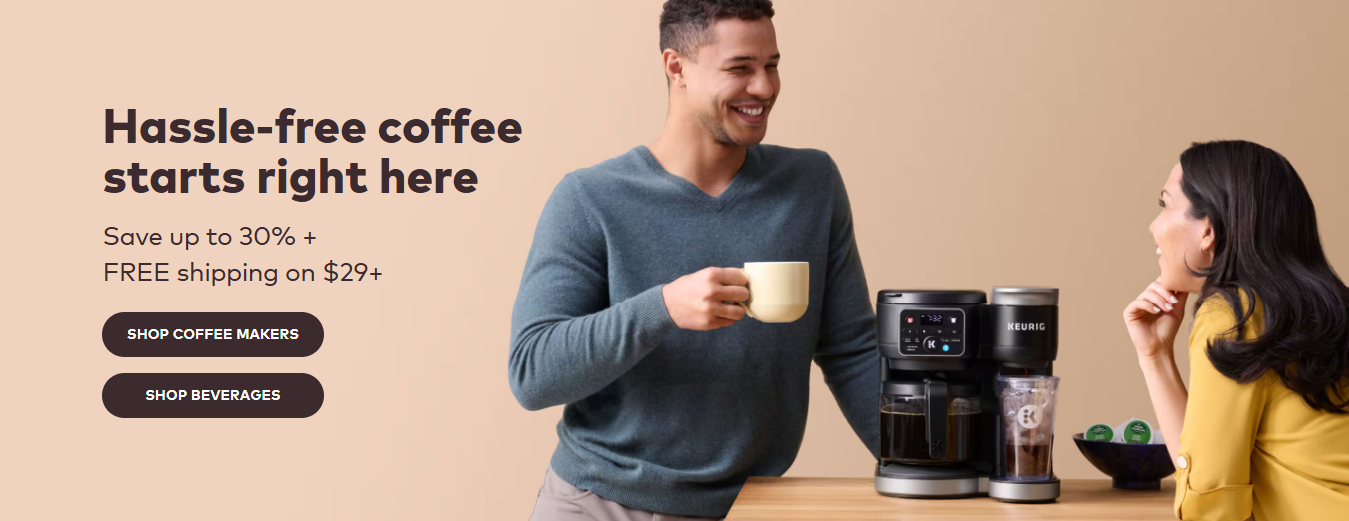Leveraging Django, Python, and Machine Learning to Enhance Customer Experience
Live URL: https://www.keurig.com/
Technologies: Django, Python, Machine Learning
Location: Burlington, Massachusetts, USA
Industry: E-commerce, Beverage Retail
Keurig, a leading name in the coffee industry, has significantly transformed its business model by introducing a versatile e-commerce platform that caters to diverse consumer preferences. This platform offers customers the flexibility to purchase coffee through subscriptions, one-time purchases, and various other models, enhancing convenience and personalization in the purchasing process.
By integrating advanced technologies such as Django, Python, and machine learning, Keurig has enhanced its digital presence, providing a seamless and personalized shopping experience. The use of Django and Python has enabled the development of a robust and scalable platform, facilitating efficient management of user interactions and transactions. Machine learning algorithms analyze customer behavior and preferences, allowing for tailored recommendations and personalized marketing strategies.
In addition to its e-commerce advancements, Keurig has innovated its product offerings with the introduction of BrewID™ technology. This next-generation platform is designed to give consumers a perfectly customized, rich full-flavored coffee just the way they like it. The K-Supreme Plus® SMART brewer with BrewID™ is the first to feature this technology, which recognizes the specific K-Cup® pod being used and automatically adjusts the brew settings to optimize flavor and strength.
Furthermore, Keurig has expanded its reach by implementing AI-driven solutions in retail environments. For instance, Keurig Canada has revolutionized the shopping experience in Walmart stores by introducing a chatbot based on generative AI. This virtual assistant is capable of instantly answering customers’ questions and guiding them to the coffee maker perfectly suited to their needs and preferences, thereby enhancing customer engagement and satisfaction.
Through these technological advancements and innovative approaches, Keurig continues to lead in the coffee industry, adapting to changing consumer behaviors and preferences by providing versatile purchasing options and personalized experiences both online and in-store.
Significant Challenge
Transitioning from traditional retail to a dynamic e-commerce platform presented several challenges for Keurig:
- Complex Subscription Management: Implementing a system capable of handling multiple subscription tiers, frequencies, and personalized options required a robust and flexible framework. This complexity was heightened by the need to offer customizable subscription plans that could adapt to individual customer preferences, such as selecting specific coffee blends, delivery schedules, and quantity variations. Developing an intuitive user interface to manage these options added an additional layer of difficulty, necessitating seamless integration with backend systems to ensure accurate order processing and fulfillment.
- Scalability and Performance: Ensuring the platform could efficiently manage high traffic volumes, especially during promotions or peak shopping periods, was crucial. The system needed to accommodate sudden spikes in user activity without compromising performance or user experience. This required implementing scalable server architectures, load balancing, and efficient database management to handle concurrent users and transactions smoothly. Additionally, optimizing page load times and ensuring rapid response rates were essential to maintain customer satisfaction and reduce bounce rates.
- Personalized Customer Experience: Delivering tailored recommendations and personalized interactions necessitated the integration of sophisticated machine learning algorithms. Analyzing customer data to understand preferences, purchase history, and browsing behavior enabled the creation of customized product suggestions and marketing messages. Implementing these algorithms required a deep understanding of data science and the ability to integrate machine learning models into the existing platform infrastructure. Continuous refinement of these models was essential to adapt to changing consumer behaviors and preferences.
- Secure Payment Processing: Facilitating secure, seamless transactions for both one-time purchases and recurring subscriptions required comprehensive payment gateway integrations. Ensuring compliance with industry standards and regulations, such as PCI DSS, was imperative to protect customer payment information and build trust. Implementing features like tokenization, encryption, and secure authentication mechanisms helped safeguard sensitive data. Additionally, managing various payment methods and currencies to cater to a diverse customer base added complexity to the payment processing system.
Satisfying Solution
To address these challenges, Keurig implemented a solution leveraging Django and Python for backend development, complemented by machine learning techniques:
- Django Framework: Utilized for its scalability, security features, and rapid development capabilities, enabling efficient management of complex subscription models and user interactions.
- Machine Learning Integration: Employed to analyze customer data, enabling personalized recommendations and enhancing user engagement through tailored content.
- Secure Payment Gateways: Integrated reliable payment processors to manage both one-time and recurring transactions, ensuring a seamless checkout experience.
Substantial Benefits
The implementation of this advanced e-commerce platform yielded significant benefits:
- Enhanced Customer Satisfaction: Personalized experiences and flexible purchasing options led to increased customer loyalty and satisfaction.
- Increased Revenue Streams: The subscription model provided a steady revenue stream, while accommodating one-time purchases attracted a broader customer base.
- Operational Efficiency: Automated processes and scalable infrastructure reduced operational costs and improved overall efficiency.
Real-Life Example
A customer opts for Keurig’s auto-delivery subscription service, selecting their preferred coffee varieties and delivery frequency. The platform, powered by machine learning, analyzes their purchase history and suggests new flavors they might enjoy. The seamless transaction process and personalized recommendations enhance the customer’s experience, fostering brand loyalty.
Traffic Analysis
- Total Organic Traffic: Approximately 548.4K visits.
- Traffic Value: Estimated at $168.4K, indicating the potential cost savings from organic search visibility compared to paid advertising.
- United States: Dominates with 95% of the traffic, reflecting Keurig’s strong presence and brand recognition in the U.S. market.
- Canada: Accounts for 2% of the traffic, suggesting a growing market segment.
- Other Countries: The Philippines, United Kingdom, and India each contribute a minimal percentage, indicating potential areas for market expansion.
Enhancing with Django, Python, and Machine Learning
The choice of Django and Python provided a robust foundation for Keurig’s e-commerce platform, offering:
- Rapid Development: Django’s modular architecture facilitated quick implementation of new features and functionalities.
- Scalability: The framework’s ability to handle increased loads ensured consistent performance during high-traffic periods.
- Machine Learning Capabilities: Python’s extensive libraries enabled the development of sophisticated algorithms for personalized customer interactions.
Features
Key features of Keurig’s e-commerce platform include:
- Flexible Subscription Options: Customers can choose from various subscription plans, adjusting frequency and product selections as desired.
- Personalized Recommendations: Machine learning algorithms suggest products based on individual customer preferences and behaviors.
- Secure Payment Processing: Integration with trusted payment gateways ensures safe and efficient transactions.
- User-Friendly Interface: An intuitive design enhances the shopping experience, making it easy for customers to navigate and make purchases.
Conclusion
By embracing advanced technologies and innovative business models, Keurig has successfully transitioned into the e-commerce space, offering customers flexible purchasing options and personalized experiences. The integration of Django, Python, and machine learning has been instrumental in this transformation, providing a scalable, efficient, and customer-centric platform that meets the evolving demands of the modern consumer.
References:
- Django Documentation
Official documentation for Django, offering detailed information about the framework’s features and capabilities.
URL: https://docs.djangoproject.com/en/stable/
- Django Documentation
- Django ORM (Object-Relational Mapping)
A guide on how Django’s ORM simplifies database management and interaction in Django applications.
URL: https://docs.djangoproject.com/en/stable/topics/db/models/
- Django ORM (Object-Relational Mapping)
- SEO Optimization Strategies
Insights into effective SEO practices for improving website visibility and organic traffic.
URL: https://moz.com/beginners-guide-to-seo
- SEO Optimization Strategies
- User-Centered Design Principles
An overview of designing digital platforms with a focus on user needs and experiences.
URL: https://www.usability.gov/what-and-why/user-centered-design.html
- User-Centered Design Principles
- Web Performance Optimization
Best practices for enhancing website performance and ensuring scalability.
URL: https://developers.google.com/web/fundamentals/performance/
- Web Performance Optimization


